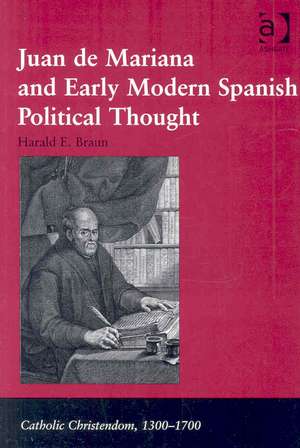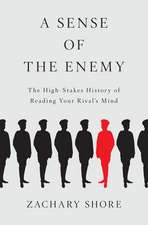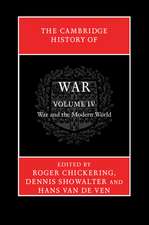Juan de Mariana and Early Modern Spanish Political Thought: Catholic Christendom, 1300-1700
Autor Harald E. Braunen Limba Engleză Hardback – 6 iun 2007
Din seria Catholic Christendom, 1300-1700
- 9%
 Preț: 1038.14 lei
Preț: 1038.14 lei - 15%
 Preț: 269.84 lei
Preț: 269.84 lei - 18%
 Preț: 1000.27 lei
Preț: 1000.27 lei -
 Preț: 388.13 lei
Preț: 388.13 lei -
 Preț: 416.22 lei
Preț: 416.22 lei - 25%
 Preț: 825.06 lei
Preț: 825.06 lei -
 Preț: 416.22 lei
Preț: 416.22 lei -
 Preț: 469.34 lei
Preț: 469.34 lei - 18%
 Preț: 1054.71 lei
Preț: 1054.71 lei - 18%
 Preț: 1060.25 lei
Preț: 1060.25 lei - 18%
 Preț: 1008.17 lei
Preț: 1008.17 lei - 18%
 Preț: 1062.62 lei
Preț: 1062.62 lei -
 Preț: 436.14 lei
Preț: 436.14 lei - 18%
 Preț: 1063.41 lei
Preț: 1063.41 lei - 15%
 Preț: 259.31 lei
Preț: 259.31 lei - 31%
 Preț: 767.95 lei
Preț: 767.95 lei -
 Preț: 465.39 lei
Preț: 465.39 lei - 18%
 Preț: 1059.45 lei
Preț: 1059.45 lei - 16%
 Preț: 237.38 lei
Preț: 237.38 lei - 18%
 Preț: 1054.71 lei
Preț: 1054.71 lei - 18%
 Preț: 1060.74 lei
Preț: 1060.74 lei - 25%
 Preț: 769.92 lei
Preț: 769.92 lei -
 Preț: 436.14 lei
Preț: 436.14 lei - 18%
 Preț: 1054.71 lei
Preț: 1054.71 lei -
 Preț: 436.14 lei
Preț: 436.14 lei - 18%
 Preț: 1061.81 lei
Preț: 1061.81 lei - 28%
 Preț: 822.76 lei
Preț: 822.76 lei - 18%
 Preț: 1116.27 lei
Preț: 1116.27 lei - 18%
 Preț: 1056.14 lei
Preț: 1056.14 lei - 18%
 Preț: 1000.27 lei
Preț: 1000.27 lei - 18%
 Preț: 1109.18 lei
Preț: 1109.18 lei - 16%
 Preț: 299.52 lei
Preț: 299.52 lei - 16%
 Preț: 260.73 lei
Preț: 260.73 lei - 28%
 Preț: 821.53 lei
Preț: 821.53 lei - 18%
 Preț: 1005.01 lei
Preț: 1005.01 lei - 28%
 Preț: 820.71 lei
Preț: 820.71 lei - 18%
 Preț: 1008.86 lei
Preț: 1008.86 lei
Preț: 1055.69 lei
Preț vechi: 1287.43 lei
-18% Nou
Puncte Express: 1584
Preț estimativ în valută:
202.03€ • 210.15$ • 166.79£
202.03€ • 210.15$ • 166.79£
Carte tipărită la comandă
Livrare economică 14-28 aprilie
Preluare comenzi: 021 569.72.76
Specificații
ISBN-13: 9780754639626
ISBN-10: 0754639622
Pagini: 214
Dimensiuni: 156 x 234 x 14 mm
Greutate: 0.48 kg
Ediția:1
Editura: Taylor & Francis
Colecția Routledge
Seria Catholic Christendom, 1300-1700
Locul publicării:Oxford, United Kingdom
ISBN-10: 0754639622
Pagini: 214
Dimensiuni: 156 x 234 x 14 mm
Greutate: 0.48 kg
Ediția:1
Editura: Taylor & Francis
Colecția Routledge
Seria Catholic Christendom, 1300-1700
Locul publicării:Oxford, United Kingdom
Notă biografică
Harald E. Braun is Lecturer in European History in the Department of History, University of Liverpool, UK.
Recenzii
’... a book of prime importance: a brilliant and incisive study of one of the most celebrated, indeed infamous, political philosophers of the Spanish Golden Age. ...Dr Braun's study of Mariana and of De rege is highly compressed in its analysis and uncompromising in its scholastic rigour. ...his book will be required reading for everyone interested in political theory and courtly politics in Spain, for it adds substantially to our understanding of the intellectual background, to the ebb and flow of courtly politics. ... Dr Braun is to be congratulated on placing this most difficult of writers into his proper context and in introducing him to a wider audience.’ Reviews in History ’... this is an important book on a major political writer of early modern Spain.’ Journal of Ecclesiastical History ’... it is the benchmark against which future accounts of Mariana, and for that matter of the second scholastic and reason of state, must be judged.’ History of Political Thought ’Braun places Mariana’s thoughts squarely in the Europe of his day (1599) and provides a wonderful treatment of an important writer...’ Sixteenth Century Journal ’This learned study of Juan de Mariana’s 1599 treatise De rege et regis intitutione (On Kingship) is a welcome contribution to the history of early modern political thought.’ Bulletin of Spanish Studies ’The re-examination of Mariana in light of recent historiographical developments is a valued addition to the prestigious series ’Catholic Christendom, 1300-1700’.’ Heythrop Journal
Cuprins
Introduction; Chapter One Human Nature, the Origins of Civil Society, and the Power of Princes; Chapter Two Power and the Law; Chapter Three ‘True Power’: Abandoning the Discourse on Sovereignty; Chapter Four Prudence, History and Providence; Chapter Five Guardians of the Realm; conclusion Conclusion;
Descriere
Juan de Mariana's 1599 treatise On the King and the Education of the King has generally been regarded as one of the early stepping stones towards a modern pluralist and democratic thought. Yet when his work is studied in detail and put into the context of Spanish and the wider European politics, and the ongoing dynamics of the Catholic Reformation, it can convincingly be argued that this is a misleading view. Instead, this book presents the case for viewing Mariana as a champion of Christian moral reform, concerned with the transformation of the Spanish monarchy under the leadership of the Church.











